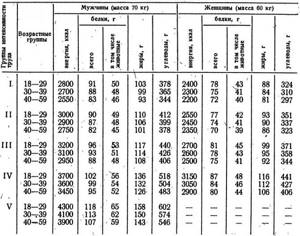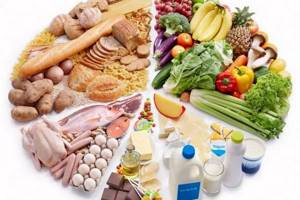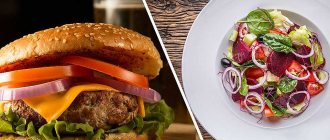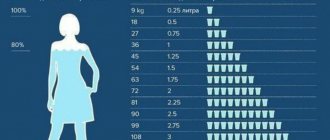What is the insidiousness of lost kilograms
When the weight loss maintenance phase comes, there are some factors you can't control: age, gender, genetics. But your food choices, amount of exercise, and how often you sit or move during the day can all be kept under control.
Common reasons why weight returns:
- Restrictive diets: Excessive calorie restriction slows metabolism and alters hormones that regulate appetite.
- Wrong thinking: You think of diet as a quick fix rather than a long term solution to a healthy lifestyle. Once you lose weight, your body wants to gain it back. It does not see the difference between deliberate loss and the onset of famine. The body immediately goes into defense mode, lowering metabolism and stimulating appetite to conserve fat reserves.
- lack of sustainable habits: many diets are based on willpower, and not on habits that should become part of everyday life. Following an unrealistic exercise plan, say 5 days a week at the gym and an extreme diet, is only possible for a short period of time. But you need to learn to live and eat differently all the time.
How to eat properly so as not to gain excess weight, lose weight and not put a strain on the body
The diet for people who want to lead a healthy lifestyle is considered to be 4-5 meals a day. You should eat food in small quantities, in small portions every 3-4 hours. At the beginning and middle of the day, it is recommended to eat food containing the largest amount of nutrients (proteins, fats, carbohydrates), since it takes a long time to digest. For people with diseases of the gastrointestinal tract, they should eat 5-6 times a day and the break between meals should not be more than 2 hours. It is not recommended to eat 2 hours before bedtime, otherwise food that has not had time to be digested will put pressure on the stomach and diseases such as gastritis and pancreatitis may develop in the future. Also for dinner you need to limit the intake of fatty and spicy foods, as well as foods containing large amounts of fiber and extractive substances. It must be remembered that an adult needs to take 2-2.5 liters per day. liquids: pure water, products and dishes containing water in their composition. It is necessary to distribute the fluid intake in such a way that most of it falls in the first half of the day in order to avoid a heavy load on the kidneys.
The daily diet can be divided into 4 meals: breakfast, lunch, afternoon snack and dinner. Breakfast needs to be given special attention, it should be as filling and nutritious as possible - 30%, lunch - 40%, afternoon snack - 10%, dinner - 20%. If it is impossible to eat more than 3 times a day, the distribution of the daily diet should look something like this: breakfast should account for about 35% of the calorie content of the daily diet, for lunch - 45%, for dinner - about 20%. It is better to have breakfast half an hour after waking up; if there is no appetite even then, then it is necessary to reduce the amount of food consumed at dinner.
With four meals a day, the load on the stomach is noticeably reduced, performance increases, and the risk of myocardial infarction decreases. While eating, you need to sit straight, without slouching, and you cannot watch TV or read the newspaper. As you know from biology courses, the tongue, teeth and salivary glands are involved in digestion. Food should be chewed thoroughly, then moistened generously with saliva, which contains the enzyme amylase, which breaks down carbohydrates.
The physiological requirements for energy and nutrients are different for women and men; for the former they range from 2000-2800 kcal/day, for the latter - 2500-4200 kcal/day, depending on the age and physical activity of both; their fluctuations are noticeable in the table below. It should also be noted that the entire working population is divided into 5 groups according to the intensity of work: Group 1 - workers engaged primarily in mental work (teachers, educators, technical engineers, medical workers, literary, scientific, and printing workers); Group 2 - workers engaged in light physical labor (physical education teachers, salespeople, garment workers, agronomists, livestock specialists, telegraph and radio-electronic workers); Group 3 - workers of moderate labor (surgeons, service technicians, machine operators, mechanics, chemists, food and light industry workers, drivers of transport, public utilities and catering, railway workers); Group 4 - workers engaged in heavy physical labor (builders, agricultural workers, machine operators, workers in the gas, oil and woodworking industries, metallurgists, foundry workers), Group 5 - workers engaged in particularly heavy physical labor (steelworkers, mining workers, loggers, masons, concrete workers, diggers, loaders, miners). The table below shows the norms of physiological needs for people of different age groups and work intensity groups.

So, using this table, you can individually select your daily calorie requirement, conditionally divide it into the available number of meals and choose the foods you like. The calorie content of these products must naturally correspond to the norm of physiological need. If you need to lose weight, then everyone knows that this must be done gradually - 1-2 kg per week, and you can also reduce the number of calories consumed per day by 200-400 units.
What to do to avoid gaining weight after a diet

It would be more correct not to go on an express diet for 2 weeks, but to choose, for example, a Mediterranean diet. Essentially, it's healthy eating for life. If the diet lasted several months, then such nutrition would become the norm, for which you do not need to make excessive efforts. But so that the efforts already expended do not go to waste, you will have to work on yourself further.
Mindful Eating
Make a pact with yourself and avoid unconscious eating. We are talking about random snacks - you don’t even remember how many of them there were during the day. Make eating the main event. Set the table, turn off the TV and phone and just enjoy your meal. Mindful eating allows you to hear your body's signals that it is full. This is difficult in the modern pace of life, we tend to eat on the go, so be patient. A good helper for women losing weight is chromium picolinate, which reduces cravings for sweets.
Menu for a week after the diet

ABC of diets We offer you a sample menu for the week after the diet. Meals should be every 3 hours.
- Breakfast – unsweetened tea or coffee.
- Second breakfast - vegetable salad with a tablespoon of vegetable oil. Serving size – 150 g.
- Lunch – vegetable soup (200 g) and salad or porridge or a piece of boiled meat (150 g). The salad can be replaced with a glass of fresh juice.
- Afternoon snack – 1-2 fruits or 150 g of vegetable salad and a glass of tea without sugar.
- Dinner – 5% fat cottage cheese or steamed chicken cutlet and boiled rice, orange or apple.
- Second dinner (no later than 2 hours before bedtime) – kefir and a piece of bread with bran.
Gradually, the portion size needs to be increased. But don’t rush to introduce unhealthy foods into your diet, such as fried potatoes, cakes or smoked meats. Leave yourself one or two favorite dishes, which you absolutely cannot live without, and allow yourself to eat them once a week, half a portion. This will save you from stress and your figure from extra centimeters.
Physical activity and training

To prevent weight gain, you need 150-250 minutes of moderate exercise per week, or 20-35 minutes daily. Remember, all people are different, different metabolic processes, genetics. Some require more load and restrictions, others less.
Another culprit for weight gain is exposure to cars, TV, computers and other electronics that encourage sitting for hours at a time. Limit communication with them, refuse the elevator, go to the store on foot, create physical activity. It's better to do the minimum than nothing.
Limit carbs and eat fiber

Be careful about your carbohydrate intake, pay attention to the types and amounts. Large amounts of refined carbohydrates such as white bread, pasta and fruit juice will ruin your goals.
Eat more vegetables and protein at every meal. Include 20 grams of protein at each meal. Protein increases levels of certain hormones that regulate weight and make you feel full.
How to get out of different diets?
Most diets do not provide a varied and balanced diet. When you sit on them, the body receives a certain type of substance, for example, only proteins or only fiber and vitamins. At the end of the diet, the task is to gradually introduce the missing substances into the diet.
If you were on buckwheat porridge, then first of all, oranges, apples or yogurt, which are not dangerous for weight loss, are introduced into the menu after the diet. Innovations are added once a day. First, you replace one meal from the diet with one piece of fruit. Then you eat all day as if you were on a diet. The next day, replace two meals with yogurt and fruit, and so on.
First of all, after the diet you should return to eating dairy products, eggs, fruits and vegetables. Fish and meat are added last. This transition period lasts about five days.
Coming off a protein diet takes longer and is more difficult. Here you will have to watch your diet for about six months. The first increases in carbohydrates should be no more than 60 g per day. If you exceed this amount, then the next day should be a protein fasting day. If you want to eat more carbohydrates, exercise. With regular exercise, the amount of carbohydrates can be increased to 120 g. But the carbohydrates should be complex: cereals, cereals and legumes. Cakes and pastries are now taboo for you.
If you have been counting calories, then continue to do so. Experts say that in the first days after finishing the diet you need to consume about 2000 kcal per day. You need to increase your caloric intake gradually. If you ate a lot before the diet, do not expect to return to your previous diet, otherwise you will gain weight again.
Manage stress and get enough sleep

Insufficient sleep is a major risk factor for weight gain. This is because lack of sleep leads to higher levels of ghrelin, a hunger hormone that increases appetite. In addition, people who sleep poorly have lower levels of leptin, which controls appetite. And simply, if a person does not get enough sleep, he does not have enough motivation and strength to train.
Stress is a common trigger for impulsive eating. You eat even when you are not hungry.










